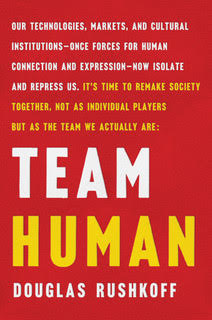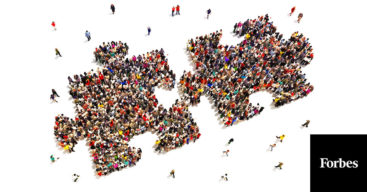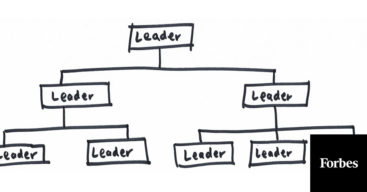 Douglas Rushkoff has written a slap in the face. It’s a loving slap, but a slap nonetheless. And it’s a slap we could all use right now. The essence is this: we humans have created a host of wonderfully freeing advances, but over time they’ve come to enslave and control us–and we need to wake up. We need to question what we call “facts” and remember the potential of our collective humanity. The book is arranged into 100 brief essays under 14 topic headings. From beginning to end you will find yourself saying “yes!” to much of it. And even if you don’t agree with everything he says, you will find his writing helpful in clarifying your thinking. You can find the book here.
Douglas Rushkoff has written a slap in the face. It’s a loving slap, but a slap nonetheless. And it’s a slap we could all use right now. The essence is this: we humans have created a host of wonderfully freeing advances, but over time they’ve come to enslave and control us–and we need to wake up. We need to question what we call “facts” and remember the potential of our collective humanity. The book is arranged into 100 brief essays under 14 topic headings. From beginning to end you will find yourself saying “yes!” to much of it. And even if you don’t agree with everything he says, you will find his writing helpful in clarifying your thinking. You can find the book here.
Below are a few passages that stuck with me:
On Social Media…
What people couldn’t or wouldn’t pay for with money, we would now paid for with personal data. But something larger had also changed. The platforms themselves were no longer in the business of delivering people to one another; they were in the business of delivering people to marketers. Humans were no longer the customers of social media. We were the product.
On losing track of figure and ground (a section I found particularly eye opening)…
When we lose track of figure and ground, we forget who is doing what for whom and why. We risk treating other people as objects. Worse, we embed these values in our organizations or encode them into our technologies. By learning to recognize reversals of figure and ground, we can liberate ourselves from the systems to which we have become enslaved… Take money: it was originally invented to store and enable transactions. Money was the medium for the marketplace’s primary function of value exchange. Money was the ground, and the marketplace was the figure. Today, the dynamic is reversed: the acquisition of money itself has become the central goal, and the marketplace is just a means of realizing that goal. Money has become the figure, and the marketplace full of people has become the ground.
On losing track of figure and ground with regards to schools…
Once we see competitive advantage and employment opportunity as the primary purposes of education rather than its ancillary benefits, something strange begins to happen. Entire curriculums are rewritten to teach the skills that students will need in the workplace. Schools consult corporations to find out what will make students more valuable to them. For their part, the corporations get to externalize the costs of employee training to the public school system, while the schools, in turn, surrender their mission of expanding the horizons of the working class for the more immediate purpose of job readiness.
On the digital media environment…
A search engine designed to promote academic thought became the world’s biggest advertising agency, and a social media platform designed to help people connect became the world’s biggest data collector…
Living in a digitally enforced attention economy means being subjected to a constant assault of automated manipulation. Persuasive technology, as it is now called, is a design philosophy taught and developed at some of America’s leading universities and then implemented on platforms from e-commerce sites and social networks to smartphones and fitness wristbands. The goal is to generate “behavioral change“ and “habit formation,“ most often without the user’s knowledge or consent.
Those of us who want to preserve the prosocial, one-world vision of the TV media environment, or the reflective intellectualism of the print era, are the ones who must stop looking back. If we are going to promote connection and tolerance, we’ll have to do it in a way that recognizes the biases of the digital media environment in which we are actually living, and then encourages human intervention in these otherwise automated processes…
On mechanomorphism (machines becoming more like us and vice versa)…
It’s not that wanting to improve ourselves, even with seemingly invasive technology, is so wrong. It’s that we humans should be making active choices about what it is we want to do to ourselves, rather than letting the machines, or the markets propelling them, decide for us.
On economics…
The economy needn’t be a war; it can be a commons. To get there, we must retrieve our innate goodwill.… The commons is not a winner-take-all economy, but an all-take-the-winnings economy. Shared ownership encourages shared responsibility, which in turn engenders a long-term perspective on business practices. Nothing can be externalized to some “other“ player, because everyone is part of the same trust, drinking from the same well.
Capitalism as it’s currently being executed is the enemy of commerce, extracting value from marketplace is in delivering it to remote shareholders. The very purpose of the capitalist operating system is to prevent widespread prosperity…Corporations are still great at sucking all of the money out of the system but they’re awful at deploying those assets once they have them.
That growth mandate remains with us today. Corporations must grow in order to pay back their investors.… With each new round of growth more money in value was delivered up from the real world of people and resources to those who have the monopoly on capital. That’s why it’s called capitalism.
In perhaps the most spectacular reversal of figure and ground we’ve yet witnessed corporations have been winning court cases that give them the rights of human beings.
The human beings running those enterprises are no less the psychic victims of their companies practices then the rest of us, which is why it’s so hard for them to envision a way out.
On artificial intelligence…
We’ve got a greater part of humanity working on making our social media feeds more persuasive than we have on making clean water more accessible.
We must not accept any technology as the default solution for our problems. When we do, we end up trying to optimize ourselves for our machines, instead of optimizing our machines for us.
On solving complex problems…
We have been trained to expect an answer to every question, and an ending to every beginning. We seek closure and resolution, growing impatient or even despondent when no easy answer is in sight. This fuels capitalism and consumerism, which depend on people believing that they are just one stock market win or product purchase away from fulfillment. It’s great for motivating a nation to, say, put a man on the moon before the end of the decade, or go to war against some other nation.
But it doesn’t serve us as we attempt to contend with long- term, chronic problems. There’s no easy fix for climate change, the refugee crisis, or terrorism. How do we even know when we’re done? There’s no flag to plant, no terms of surrender. Motivating a society to address open-ended challenges requires a more open-ended approach—one that depends less on our drive toward climax than on our capacity for unresolved situations. Like life.
The planet’s complex biosphere will survive us, one way or the other. Our own continuing participation, however, is in some doubt.
On expanding our view of what we can change…
We must learn to distinguish between the natural world and the many constructions we now mistake for preexisting conditions of the universe. Money, debt, jobs, slavery, countries, race, corporatism, stock markets, brands, religions, government, and taxes are all human inventions. We made them up, but we now act as if they’re unchangeable laws. Playing for Team Human means being capable of distinguishing between what we can’t change and what we can
You are not alone…
As much as we think we’re separate individuals, we’re wired from birth and before to share, bond, learn from, and even heal one another. We humans are all part of the same collective nervous system. This is not a religious conviction but an increasingly accepted biological fact.
We can’t go it alone, even if we wanted to. The only way to heal is by connecting to someone else.
But it also means that when one of us is disturbed, confused, violent, or oppressed, the rest of us are, too. We can’t leave anyone behind or none of us really makes it to wherever we think we’re going. And we can’t just stay confused and depressed ourselves without confusing and depressing everyone who is connected to us.
This is a team sport.



